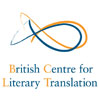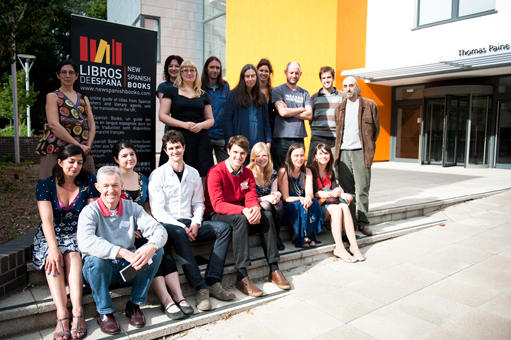New Spanish Books: The online guide of titles from Spanish publishers and literary agents with rights for translation in the UK. To consult titles available in other markets please click on the above links.
BCLT Spanish summer course: an interview with present and future translators.
 Once again New Spanish Books was the proud sponsor of the Spanish workshop at the BCLT summer course. The participants, some of the best talents of Spanish translation in the UK, were Ollie Brock, Tom Bunstead, Hugh Caldin, Lucila Cordone, Alba Griffin, James Knight, Bridget Lely, Michael McDevitt, Shazea Quraishi, Samantha Christie, Avgi Daferera and Sabrina Steiner. They were lead by renowned translator Anne McLean, and had the privilege of having Eduardo Halfon, whose titles have been selected twice in the UK Panel’s Choice, as writer-in-residence.
Once again New Spanish Books was the proud sponsor of the Spanish workshop at the BCLT summer course. The participants, some of the best talents of Spanish translation in the UK, were Ollie Brock, Tom Bunstead, Hugh Caldin, Lucila Cordone, Alba Griffin, James Knight, Bridget Lely, Michael McDevitt, Shazea Quraishi, Samantha Christie, Avgi Daferera and Sabrina Steiner. They were lead by renowned translator Anne McLean, and had the privilege of having Eduardo Halfon, whose titles have been selected twice in the UK Panel’s Choice, as writer-in-residence.
We took the opportunity to learn how they see their profession, the challenges they meet, and their own personal tastes. Read what they had to say, in their own voice.

Friends of New Spanish Books at BCLT Summer course - Photographer: Anita Staff [email protected]
What led you to learn Spanish?
“The first event that caused me to learn Spanish was my being chucked out of my Geography Class at 13 and having to find a new subject. Subsequently my greatest influences were excellent teaching at school and university and the encouragement of a hugely kind Spanish family who took me in during 3 successive summers.” Hugh Caldin
“When I was 12, I went to a new school, and I had to choose a language out of 2 choices – Spanish or French. I chose the former after long consideration because my mother informed me that both she and my stepfather had taken Spanish, and I wanted to be able to get help from both of them, and not just rely on one.”Sabrina Steiner
“I learned Spanish in high school in Canada, when I also learned French and German. Spanish immediately felt familiar, somehow. And when I lived in Spain, I felt myself at home.” Shazea Quraishi
“I was named after a character in Isabel Allende’s “La casa de los espírirtus” and so it seemed like a good enough reason as any to choose Spanish over German or Italian when the choice had to be made at school. That, coupled with my mother’s impressive library of literature from the Spanish-speaking world, has propelled me into the world of Spanish and Latin American studies.” Alba Griffin
“Essentially, a series of random, unconnected events. It was never a particular goal of mine and yet, here I find myself with a Spanish wife, a flat and a job. Worse things can happen.”Michael McDevitt
…And to become a translator?
“What drove me to become a translator was the love for the literature, writing, and the English language (which I learnt as a second language in Argentina, where I live). One of my biggest pleasures is to read a book, fall in love with it, and never want to finish it. Translating a book you love gives you the chance to love through it again, get inside it and be a part of it.” Lucila Cordone
“I’ve been working as a commercial and legal translator for some years now. On the literary side of things, I came across a competition run by Harvill Secker advertised in the Guardian last year. The challenge was to translate a short story by Matias Nespolo. Given that this was the first year the competition had been organized, that the chosen language for the first edition was Spanish and that participants had to be under the age of 35 (I was 34 at the time), it seemed like a good idea to give it a go. I was delighted to finish a runner-up and loved the actual process of translating the story and have been involved in a few sample translations and book reports since.” Michael McDevitt
“What led me to want to become a translator? First, an MA course in 1969/70 at London University with Mario Vargas Llosa as my tutor, who introduced me to Guillermo Cabrera Infante, whose early novel “Tres tristes tigres” was my dissertation subject, with his help. Secondly, I am a retired lawyer and the skills of a lawyer coincide with those of a translator: empathy with the client/author; enjoyment of the detective work to ensure full understanding of the source text/the client’s case; a desire and ability to present someone else’s case/literary work as honestly as possible; dogged attention to details in such presentation, and a craving for “eureka” moments, identifying the “mot juste” for the translation of difficult Spanish words.” Hugh Caldin
“I become a translator because I wanted to translate books from Spanish that I am really passionate about so that I can show Anglophone readers that English is not the only language with interesting literature.”Sabrina Steiner
“Reading the translated works of writers such as Juan Gabriel Vázquez makes me want to be a translator not just because of the opportunity to discover a great author, but also to aspire to the creative brilliance of translator’s like Anne McLean.” Alba Griffin
“I started learning Spanish at university, where I also studied French. I’ve always been fascinated by language and remember thinking during my year abroad, in Sevilla, that translating novels would be the perfect job, combining my love of language and reading.” Samantha Christie
“I am drawn to translation as a creative practice and as an important tool to make literature accessible beyond the borders of language, to promote understanding between cultures and individuals. And for the love of books.” Shazea Quraishi
What are the challenges to becoming a translator?
“Becoming a translator is far more challenging than I ever expected. There are all sorts of costs to consider (websites, translation organization, having the right sort of CV) that one doesn’t even think about beforehand.” Sabrina Steiner
“The main challenge for me is accessing work in Spanish that has not been translated, finding poets and writers.”Shazea Quraishi
“There are many challenges to becoming a translator; one of the main is getting an opportunity to translate even a sample and thus, prove you can do it.” Avgi Daferera
“It seems that many literary translators I speak to have a “lucky break” or “right place right time” story, so at the moment, I’m focusing on creating my own “lucky break” – not withstanding all the hard work involved! I’ll soon be finishing my MA in Literary Translation at UEA. The course and the proximity of the BCLT have been invaluable in terms of providing me with the opportunities to meet other translators, authors and publishers.”Samantha Christie
“To become a translator you need to be a good reader, to not only intimately understand a text but also to understand the individual reader and the myriad of interpretations of any one word. An impossible task, but one that makes the job so exciting.” Alba Griffin
“The challenges to becoming a translator are ignorance of the road to publisher’s hearts, and the need to keep honing one’s knowledge of English, to ensure that the English reader of the translation shares as rich a reading experience as the reader of the source text.” Hugh Caldin
What makes a good translation?
“A good translation is rooted in a close reading of the original text and recognition of the patterns and nuances it presents, and will grow from the translator’s dedication to achieving a similar impact in the new language. But a good translation will also stand alone in its own right as a literary work.”Bridget Lely
“What makes a good literary translation? A translation that flows, and that is in every way (language, tone, idiom, etc.) as easy to read as an original literary work in the same target language.” Hugh Caldin
“I believe a good translation must flow in the target language but also maintain the flavor of the culture of origin.” Lucila Cordone
“It really depends on the story, but a good translation (I think) is one which conveys the message in English without scarifying the style of the source text.”Sabrina Steiner
“A good translation is a sibling of the original text – sharing the most important features and characteristics, but its own person. Not a clone.” Shazea Quraishi
“A “good” translation, I believe, is one which conveys the essence or soul of the source text, through linguistic accuracy and preferably by reflecting the stylistic choices and literary devices the original author used.” Samantha Christie
If you could choose a writer to translate, who would that be?
“Too many to mention, but a few examples would include Alberto Olmos, Agustin Fernandez Mallo, Quim Monzo, Elvira Navarro, etc…” Michael McDevitt
“I haven’t met a contemporary Spanish poet to translate, but I love Lorca’s poems and enjoy translating them. I admire Modern Poetry in translation, Arc Publications, Carcanet, Boodaxe…” Shazea Quraishi
“If I could choose a writer to translate, it would be Juan Carlos Botero of Colombia, because the subject matter and style of his writing are so international and eternal and have such impact, and his prose style is so elegant and transparent.” Hugh Caldin
“Even though I have already translated some of his work before, I would love to translate the rest of Ildefonso-Manuel Gil’s literary catalogue.” Sabrina Steiner
“There are many writers I like. A book I read recently and enjoyed was by Ray Loriga, so perhaps something by him.” Avgi Daferera
“Amongst other areas, I’m interested in translation for children and I would love to translate some of Jordi Sierra i Fabra’s work in this respect.”Samantha Christie
A UK publishing house or imprint you admire?
“I’m a big fan of a new, independent UK publisher called And Other Stories. They strongly advocate publishing literature in translation and recognize the role of the translator (and produce beautifully tactile editions!)” Samantha Christie
“Since there are only a few British publishing houses I’m reasonably aware of (I pay far more attention to the contents of a book as opposed to where it was published), but I do like the fact that Bloomsbury published the Harry Potter books. I’m not sure that qualifies as admiration though. It’s more a case of being impressed.” Sabrina Steiner
“I guess that Bloomsbury would be at the top of the list of UK publishing houses or imprints that I admire of foreign works in translation.” Hugh Caldin
A book in Spanish you love/recommend…
“El hombre que inventó Manhattan” by Ray Loriga.Avgi Daferera
“Corazón tan Blanco” by Javier Marías.Lucila Cordone
“Any by Gabriel García Márquez, especially the shorter works like “El Coronel no tiene quien le escriba” and short stories like “La Hojaresca”, for their tension, their irresistible charm and the keyhole through which to view big concerns of love, death, passionate enthusiasm and bitter disappointment through Latin-American eyes .” Hugh Caldin
“My favorite novel in Spanish is “Don Quijote”, and my favorite poem is “Romance Gitano” by Federico García Lorca. Sabrina Steiner
